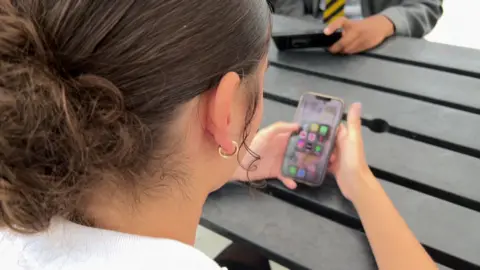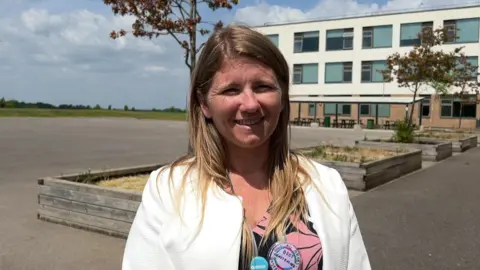Thousands pledge to keep children smartphone-free
 BBC
BBCThe parents of nearly 4,000 Oxfordshire children have pledged to deny them a smartphone until at least the end of Year Nine.
It is part of the "parent pact" launched by campaign group Smartphone Free Childhood.
The group warns that mobiles "can cause a whole host of problems, from triggering anxiety and eating disorders, to opening the door to cyberbullying or sexual predators".
It comes alongside calls to ban mobiles in all Oxford schools, though studies are mixed on whether that would make a difference to grades and behaviour.
The idea behind the pledge is to have enough parents withholding phones that their children are not left out as only one in their classes without a device.
So far, students at 270 schools in the county have been signed up, with Europa School UK in Culham garnering 204 pledges.
Allow X content?
The group's spin-off campaign Smartphone Free Schools said that a ban on devices during learning hours would "boost learning, protect mental health, improve behaviour, create safer spaces [and] protect childhood."
Will Orr-Ewing, who runs the Oxfordshire branch of the campaign and works in education, said that having mobiles in lessons was extremely distracting.
"The average child in the UK receives 237 notifications per day. If you scale that to a class of 30 kids, that's a phone pinging every few seconds," he said.
"It's now known that smartphones are heavily implicated in the catastrophic decline in young people's mental health over the past decade.
"If young people can access inappropriate content and apps during the school day then, unintentionally though it may be, schools are neglecting the welfare of their students."
Meanwhile, schools across Oxfordshire are introducing policies to restrict phone access.
Students at Aureus School in Didcot have to stow their phones in a lockable pouch every day before they enter the school.

Reflecting on the change it has made, head teacher Kirsty Rogers said: "It's incredible. The lack of disruption to lessons now is huge."
The school's previous policy was to confiscate phones when they were spotted in lessons, but Mrs Rogers said teachers were wary of doing this "through fear of what was going to happen".
"Students are absolutely addicted to these phones, and so you don't know how they're going to react to you when you say you need to confiscate them," she said.
The lockable pouches were unpopular when they were first introduced, but many students have now said they have got used to them.
"People used to get sad and angry because of something on their phone," one student said. "But now their presence of mind is in school and they can study better."
"When I'm studying, I feel more comfortable leaving it out of my reach and focusing on my education more," another added.

Studies are divided on whether prohibiting phones in schools helps studying, however.
Research by the Policy Exchange found that children at schools with an effective ban achieved GCSE results one to two grades higher than those at other schools.
But a University of Birmingham study found such bans were not linked to better grades, mental wellbeing, sleep or classroom behaviour.
Importantly, though, they noted that spending longer on smartphones and social media in general was linked with worse results for all of those measures.
The conclusion of lead author Dr Victoria Goodyear was "those bans in isolation are not enough to tackle the negative impacts".
"We need to do more than just ban phones in schools," she said.
'Everyone is on side'
Currently, there is no legislation enforcing a phones in school policy. It is down to individual head teachers what they do.
But for Oxford City councillor Jo Sandelson, that is not enough.
She has put forward a motion to the council calling for it to support an outright ban on smartphones in all Oxford schools for under-16s.
Though the council has no powers to enforce such a ban, she said "key messages coming out from the city would really show everyone is on side".
"Everyone is saying the same thing. These children are better off without the distraction of smartphones at schools," she said.
"What Eric Smit, the ex-boss of Google, says is why would we run such a large, uncontrolled experiment on the most important people in the world? Which is the next generation."
In March, the government said it believed head teachers already had the power to ban phones in schools, with its official guidance saying "schools should develop a mobile phone policy that prohibits the use of mobile phones" during lesson time.
You can follow BBC Oxfordshire on Facebook, X (Twitter), or Instagram.
